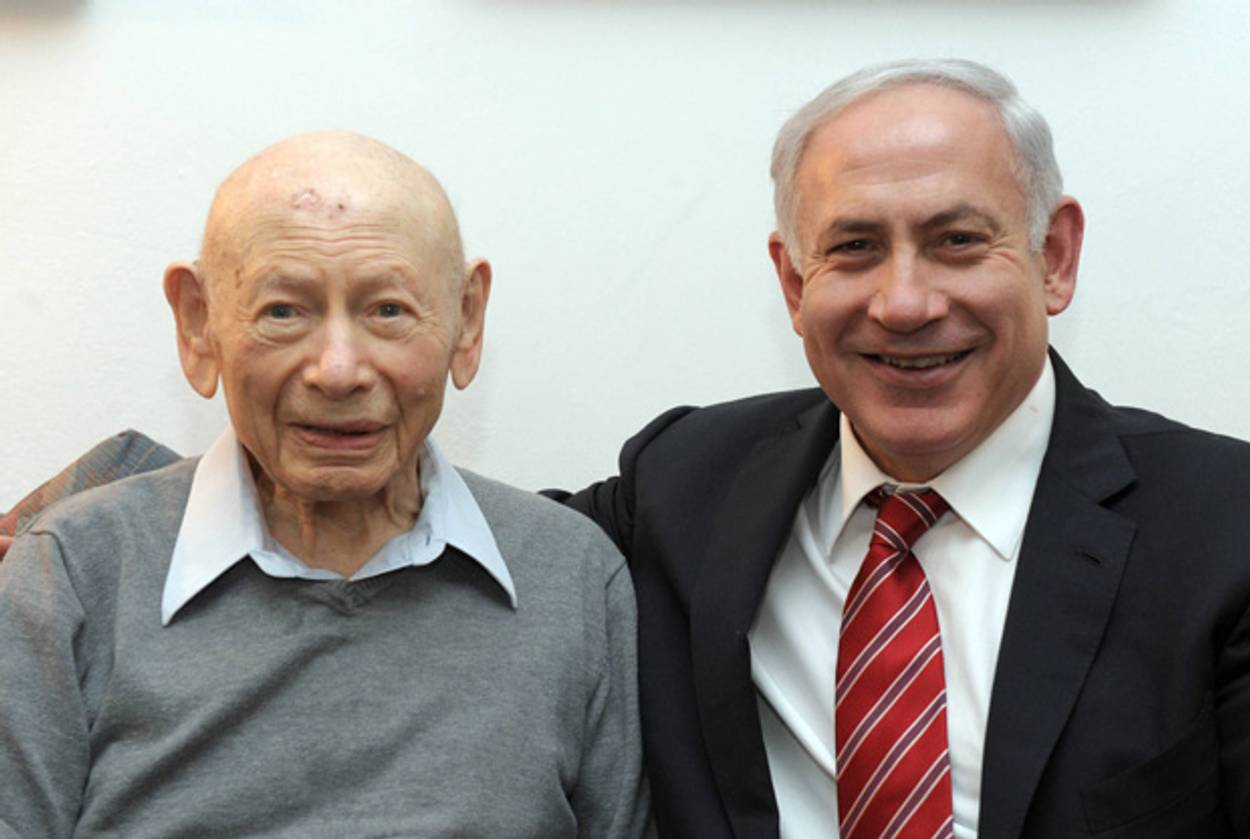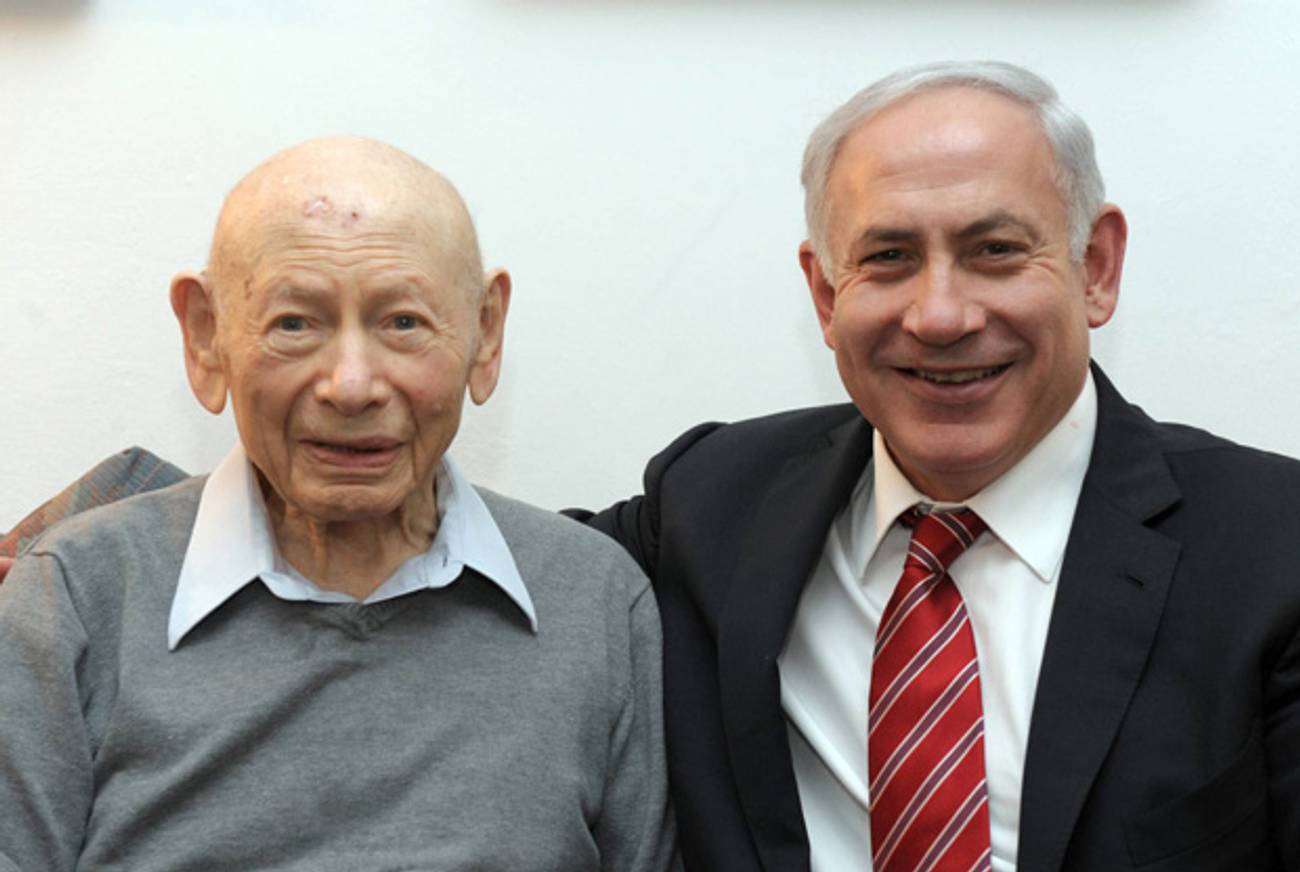Netanyahu’s Influential Father Benzion Dies
102-year-old was eminent historian, fierce Revisionist Zionist




Benzion Netanyahu, who died this morning at 102, was involved in so much of Jewish and Israeli history that if in your head you go through the top three or four facts about his life, you’re bound to miss something huge. I easily conjured that he is the father of and crucial, informal adviser to Prime Minister Netanyahu, who will likely become the longest-serving Israeli government leader since its first, David Ben-Gurion; that he is the author of a magisterial, pathbreaking, and ultimately school-setting history of the Spanish Inquisition, which concluded, after extensive research, that many Jews who had converted to Catholicism were still murdered and that therefore the prime motivation was not religious zealotry but race-hatred (his editor, Jason Epstein, recollected all this in Tablet Magazine); that he was the secretary to Vladimir Jabotinsky, the founder of Revisionist Zionism, and himself a crucial figure in that movement both as an editor and a lobbyist to the U.S. government, who persuaded both the Republicans and through them the Democrats to adopt Zionist platforms for the first time in 1944.
And I realized: I had forgotten about Yoni. Yonatan Netanyahu, Benzion’s eldest son, is perhaps the most prominent martyr of a country that has had its share: he was the commander of the elite IDF unit that rescued over 100 hostages from Entebbe, Uganda, while suffering only a single casualty—his own. Barely a generation younger than Ben-Gurion, the case could be made that Benzion Netanyahu is the father of the alternate vision of Israel that has over the years become the primary one. To the end, he staunchly opposed giving up land to the Palestinians, believing Arab anti-Semitism to be as endemic now as Spanish anti-Semitism was six centuries ago. In both the history of the Inquisition and Zionism, it seems likely that Benzion Netanyahu’s revisions supplanted the original narratives.
The prime minister’s office’s obituary is here. It notes that Benzion died in the house he moved his family into in 1952 in Jerusalem.
The cheeky headline that went through my mind—and, I guarantee you, the minds of many other observers—when I heard the news late last night was, “Bibi’s Father Dead; Now There Can Be Peace.” I don’t actually believe this, and not only because it’s tasteless. It’s inaccurate. The prime minister is a grown man. And to attribute Netanyahu’s obstinance regarding the Palestinians and, to a lesser extent, his hawkishness regarding Iran (not as large a commitment of Benzion’s, but stemming from the same eschatological fear of murderous anti-Semitism) would be to deny the leader of Israel agency and absolve him responsibility.
But there is absolutely no getting around the importance of the father to the son, a 62-year-old who leads a nation yet is universally known by that infantilizing nickname, “Bibi.”
New Yorker editor David Remnick wrote the most insightful portrait of the two, in his 1998 profile of the son that, as if by necessity, emerged more or less as a diptych under the reasoning that “to understand Bibi, you have to understand the father.” Because, as Remnick concluded: “In books, speeches, and action, Benjamin Netanyahu has proved himself his father’s son.” (In the best chapter of, yes, The Crisis of Zionism, Peter Beinart makes much the same point, although his strongest case against Bibi relies primarily on the son’s own work and deeds.)
One year ago, Remnick argued that Netanyahu’s “ingrained wariness toward Israel’s most stalwart ally and benefactor”—the United States—was only part of an “inheritance” that eliminated the chance that he would ever take any remotely bold steps on the peace process front.
But some of the armchair psychology had it that what holds Netanyahu back is not his father’s beliefs but his father himself: Netanyahu will never agree to true concessions, this thinking goes, so long as he would have to look his father in the face afterward.
Personally, I think it’s rubbish. If the father is defined by Revisionist Zionism, he is defined even more by having been a total freethinker, somebody unmoored from past dogma and unbound by all intellectual obligations that he might have been expected to follow. That part, too, is Benjamin Netanyahu’s inheritance. I hope the prime minister sees that honoring his father and taking his inheritance would involve re-enacting the form and character of his father’s thought, and not necessarily its substance.
Benzion Netanyahu, Hawkish Scholar, Dies at102 [NYT]
Related: Benzion Netanyahu’s History [Tablet Magazine]
The Outsider [The New Yorker]
Earlier: Remnick Calls for Obama Peace Plan
Marc Tracy is a staff writer at The New Republic, and was previously a staff writer at Tablet. He tweets @marcatracy.